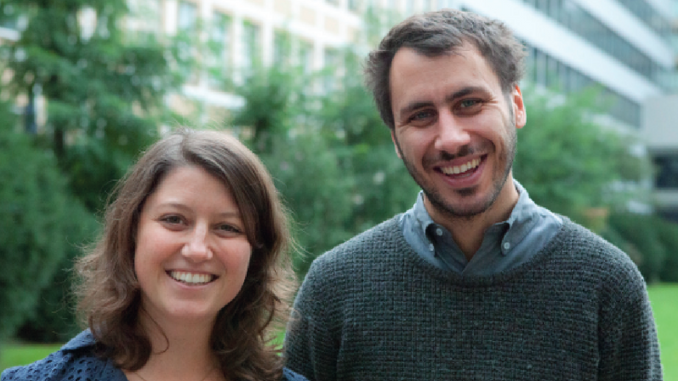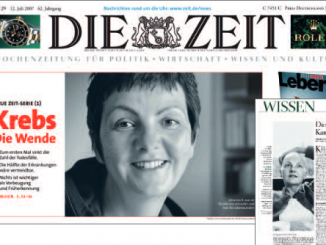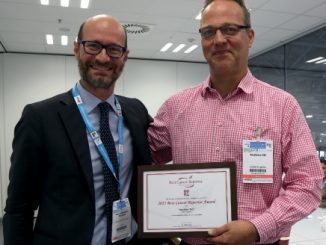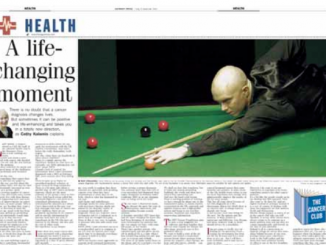
Christiane Hawranek and Marco Maurer, freelance print and radio journalists, won a Best Cancer Reporter Award for their exposé of the agencies that exploit foreign patients seeking treatment for cancer and other serious conditions. They published this piece in Die Zeit, and the story was also broadcast on radio by Bayerischer Rundfunk.
Ruslana Fadiwa is dancing, watched by her grandparents. Klavdia Petrowa, 65, and her husband Leonti Fadiw, 62, are in a gymnasium in the city of Yoshkar-Ola, 700 kilometres east of Moscow. While their eight-year-old granddaughter competes in her first major gymnastics event, they are talking about a place that they have never been to: Düsseldorf. “Do you remember how I walked round the Kremlin in Kazan three times in the hope that Ruslana would get well again in Düsseldorf?” Klavdia says to her husband. Ruslana had cancer and was treated in the University Hospital in Düsseldorf when she was four years old.
“Yes, of course,” replies Leonti, and the couple go on to describe their dealings with a medical travel agent from the German town of Lüden-scheid: he certainly helped save their granddaughter’s life, but the family are now embroiled in a long-running lawsuit because they believe he vastly overcharged for his services. The amount involved is some €45,000.
Medical travel agents arrange for patients from other countries to be treated in German hospitals; they trade on the outstanding reputation of German healthcare. Most agents have roots in their patients’ home country; their work includes finding the patient a suitable hospital in Germany, agreeing costs and dates, translating medical reports into German and providing an interpreter during the patient’s stay in Germany.
A noble occupation, it might seem. But examples from German hospitals show that agents do not always deal fairly with their customers. One doctor tells of an agent who allegedly charged the patient twice the actual cost of the hospital treatment. The head of the Coordinating Office for International Patients at Düsseldorf University Hospital says she has had “distasteful experiences” with the agencies. Bavaria’s Secretary of State for the Environment and Health says she knows of “only one or two agencies that are perhaps reputable”. A member of the board of a state chamber of physicians refers not to “medical travel agents” but to “patient touts”. Frank Ulrich Montgomery, President of the German Medical Association, asserts that there are “dubious agents” who ‘import’ patients into Germany. A nurse at a German university hospital goes so far as to say that some agents “stop at nothing”.
Jens Juszczak is sitting in his office – room E108 on the first floor of the Bonn-Rhein-Sieg University in Sankt Augustin, where he is a researcher in the Department of Economics. Juszczak has been studying medical tourism for the last ten years. On his desk are the latest research figures, which show that some 200,000 international patients came to Germany in 2012. They contribute about a billion dollars a year to the tight budgets of German hospitals, which is why talk of medical tourism usually paints a positive picture, and points to the clinics’ attempts to attract sheikhs and oligarchs. No mention is made of the fact that less-well-heeled patients, such as Ruslana Fadiwa, are also being persuaded to come to Germany. And virtually no one speaks of the agents who have interposed themselves between hospitals and patients. Juszczak says that about two-thirds of all hospitals that treat international patients make use of such agents.
Medical travel agents, like estate agents, work on a commission basis – they receive payment for each patient that they introduce. The market is not transparent. Juszczak states that up to 1,000 agents work with German hospitals; to do their job they need nothing but a mobile phone, contacts abroad and know-ledge of the relevant language. Anyone can call themselves an agent. Doctors and nurses are usually unaware of what agents have agreed with their clients. This is confirmed by Marlies von Borries, head of the Coordinating Office for International Patients at Düsseldorf University Hospital: “No, we don’t know that,” she says.
The day after Ruslana’s competition, her father, Roman Fadiw, is sitting at the kitchen table in the bright two-bedroom flat on the fourth floor of the five-storey building in Yoshkar-Ola where he lives with his wife Nadezhda and their two children, Ruslana and Serafin. In front of him is a calculation of costs amounting to €100,000, drawn up by the medical travel agency in Lüdenscheid. He has sent his daughter to play in her bedroom – he doesn’t want her to listen to the story of her illness. In February 2008 Ruslana was constantly complaining of stomach ache. The children’s hospital in Yoshkar-Ola attributed the pain to a gastric cyst – the first misdiagnosis, as the Fadiws now know.
Ruslana’s father insists on taking the reporters to the hospital at 104 Volkova – a red and grey building erected in the heyday of the Eastern Bloc. Brown-stained mattresses are stacked high, out-of-date drugs lie about in battered boxes, and in one corner stands a plant with a note attached to the pot: “This plant is sick – please don’t touch.” Roman Fadiw pauses in front of the plant and says: “living in Russia is alright if you are in good health and don’t get ill.”
Just four months after the initial investigation in Yoshkar-Ola, and after several misdiagnoses in Moscow hospitals (“oncological disease ruled out”), the Fadiws discovered what was wrong with their daughter: Burkitt’s lymphoma, a cancer of the lymph glands with good prospects of a cure if treated promptly. Because the Russian doctors had taken four months simply to arrive at a diagnosis, the family had by now lost trust in Russian hospitals. They searched on the internet for one in Germany. According to Juszczak, this is what most people do; in the former USSR people usually use the Russian search engine Yandex. Typing “treatment in Germany” into Yandex brings up virtually nothing but names of medical travel agents – the hospitals themselves are not mentioned. The Fadiws decided on the agency in Lüdenscheid because its website looked professional – there were pictures of the owner with confidence-inspiring men in white overalls. Towards the end of July 2008 they telephoned the agency and were told: “If you send me the money today, you can be in Germany tomorrow.” “I can get the money together,” replied Fadiw. By western European standards the Fadiws are an ordinary middle-class family, neither oligarchs nor desperately poor – four of them in a two-bedroom flat, bunk beds for the children, washing machine; the father, Roman, owns four fashion boutiques in the city. The bank gave them a loan of €80,000. They also borrowed money from friends. To meet their debts and pay off the first loan, they later had to take out a second one, which they have still not paid off.
When they arrived in Düsseldorf, the family say they felt “helpless and speechless”. The interpreter provided by the agency was unable to cope with medical terminology; in meetings that the Fadiws had with a senior doctor at the university hospital, he frequently said: “I can’t translate that – I don’t understand it.” Roman Fadiw tried to complain to the agency, but whenever he phoned he was told that the deposit of €100,000 was not enough and he needed to send more money. Fadiw became suspicious. He asked the agency whether he could see the hospital’s invoices. On being told that this was not possible, he made further enquiries at the hospital’s International Office.
“If you pay the money today, you can be in Germany tomorrow”
He discovered that the hospital’s bill had amounted to about €40,000 – far less than the initial payment Fadiw had made. In addition, the Fadiws had viewed the €100,000 as a security deposit – if any money were left over, they thought they would get it back, less the commission. This was confirmed by the district court of Hagen in a partial judgment pronounced in 2010. The judge declared, “No lump-sum payment was made (…) but a deposit, a lodgement.”
The agency responded to questions from Die Zeit through its lawyer, who stated that the company had also paid the family’s accommodation costs and that this was the reason for the large bill. The Fadiws dispute this. They say they stayed with acquaintances in Düsseldorf and they produced photos of a student flat near the hospital which they say they paid for themselves. Even when reminded, the lawyer sent no proof of additional costs, but only the invoices from the hospital and the interpreter, amounting to some €45,000. In his letter, the lawyer proposed that the parties “await the judicial verdict”.
Every German hospital receives a fixed sum for a particular treatment – €1,500 for a birth without complications, around €100,000 for a liver transplant. Part of the purpose of these flat-rate payments, which have been in place for ten years, is to reduce the length of hospital stays and cut costs. Previously a hospital could boost its profits by keeping patients for as long as possible; charges were based on the number of days spent in hospital. Under the flat-rate system, by contrast, hospital staff need to ensure that patients do not exceed the “maximum length of stay” – if they do, the health insurer reduces the amount it pays. This has resulted in empty beds and forced the closure of some hospitals, especially in rural areas.
The hospitals looked about for extra sources of income and discovered patients from abroad, whom they seek to attract at medical fairs in Dubai or Moscow. These patients are self-payers; their money goes direct to the hospital and can be used, for example, to buy new medical equipment, from which German patients funded by health insurers also benefit. The law acknowledges that the prices paid by self-payers are freely negotiable. But profiteering – which is defined as occurring when the payment is twice the market value of the service provided – is frowned on. Judges assume that the profiteer is exploiting the weak situation of his customer, which in the case of Ruslana Fadiwa was probably true – her parents feared for their daughter’s life.
The hospitals looked about for extra sources of income and discovered patients from abroad
The Coordinating Office for International Patients at Düsseldorf University Hospital is prepared for clients from abroad; on the way to the office we pass a large blue sign in Cyrillic and Arabic script. Marlies von Borries, who is in charge of the department, admits that her hospital works with agencies, but says that it has become more circumspect – and it no longer does business with the particular agency in Lüdenscheid. Moreover, a year and a half ago the hospital started sending out its invoices in duplicate: one copy to the agency, the other to the patient. Von Borries repeatedly emphasises that her hospital has adopted a “special approach”, since it pays no commissions.
Experts such as the economist Jens Juszczak maintain, however, that many hospitals pay “the commissions that are usual in the sector”. This means that agencies receive “bounty payments” if they send foreign patients to these hospitals. Many also charge the patient a fee – usually 15% of the treatment costs. So the agencies cash in twice – they get paid by the patients and by the hospitals.
Towards the end of 2011 the Kiel district court ruled that the commission agreement between hospital and agent was itself unethical. A medical travel agent had sued a university hospital in north Germany that had promised the agent a 22% commission for each patient, which it had not paid. “The court found that the agreement was invalid, because it damaged the relationship of mutual trust between doctor and patient through inappropriate commercialisation,” explains Norman Langhoff, a Berlin lawyer who specialises in medical law. Die Zeit is in possession of letters from a number of German hospitals that contain promises of such commissions. For Ulrich Montgomery, President of the German Medical Association, these represent “clear cases of referral for payment, which is prohibited under the medical profession’s rules”.
Julia Laube [name has been changed] is no longer prepared to keep quiet. She is a young assistant doctor at a university hospital and understands the importance of international patients to her employer. But when she speaks of the Russian woman whose treatment in her clinic was arranged by an agency, she uses the same phrase repeatedly: she died “totally alone”, says Laube, looking over her shoulder as if to reassure herself that she is not being overheard. If her boss got to hear that she had been talking about internal hospital affairs, she could be fired. “Totally alone”.
Nevertheless, Laube wants to talk. She no longer wishes to be part of a system in which patients from other countries are at the mercy of medical travel agents, hospital administrators and the pressure to cut costs. “Seeing how my patient died thousands of kilometres away from her family was devastating,” says Laube. The woman had pancreatic cancer. “At least a month before her death it was clear that we were never going to cure her.” But her family had no money to come and visit her. The doctor wondered what the agent had promised his patient to persuade her to come to Germany in the first place. She asked the senior consultant whether there were any rules for medical travel agents and their patients. “No”, was the concise answer.
The doctor wondered what the agent had promised his patient to persuade her to come to Germany
There are no rules governing what medical travel agents do, and no quality control either. The Green Party’s spokeswoman for prevention and patient rights, Maria Klein-Schmeink, wants to change that, and is calling for a certification scheme for agencies, on the grounds that foreign patients are “too easily exploitable”.
Melanie Huml, Secretary of State in the Bavarian Ministry of Health and a member of the Christian Social Union (CSU), believes it is inappropriate for the “grey area” of the medical travel agencies to be included in the glossy white and blue brochures used all over the world to publicise Bavaria as a centre of medical excellence, and attract patients such as the Fadiws to Germany. The Secretary of State, who is herself a doctor, therefore plans to set up a special government office that will provide reliable information to international patients seeking treatment in Germany – thereby bypassing the agencies. The office is set to open this year; the Bavarian government has funded the project to the tune of €5 million.
Bavaria’s Minister President Horst Seehofer (CSU) has himself spoken out in favour of the scheme. Roman Fadiw, too, sees it as a good way of getting patients to come to Germany. If this option had been available when Ruslana was diagnosed, he might not be having to go to Hagen in April for the next court hearing*. When asked whether he had not perhaps acted somewhat naively and overhastily back in 2008, he replies that he would have grasped at any straw to save his daughter. “Wouldn’t you do the same?”
*The court ruled in favour of the family last September, and they received a refund of around €50,000.
This article was first published in Die Zeit on 11 April 2013, and is reprinted by permission, © Die Zeit 2013
Cooperative research by BR-Hörfunk and ARD-‘Report München’






Leave a Reply